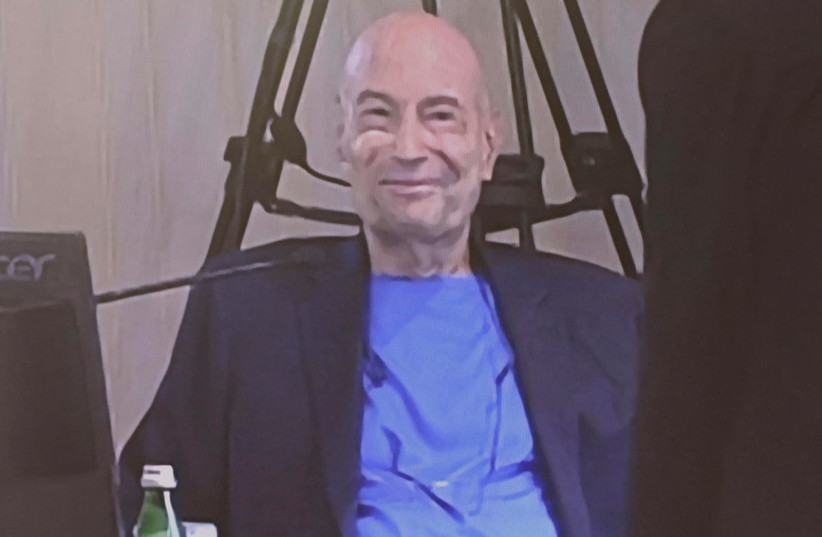Prime Minister Benjamin Netanyahu's corruption trial saw businessman Arnon Milchan over the last two weeks present a radically different image of the relationship between the two men than that of the testimony of Milchan's personal assistant Hadas Klein.
The friendship and motive behind the gifts was the most prominent narrative element in Milchan's testimony from June 25 until July 6, especially when told by Netanyahu's lawyer Amit Haddad.
Netanyahu is accused of breach of trust under Case 1000, also known as the "illegal gifts affair." Milchan and Australian businessman James Packer are alleged to have routinely and on demand given the Israeli leader expensive gifts, and Netanyahu had provided the men personal and business favors.
Klein's July 2022 testimony described Milchan as weary of the increasingly expensive gifts routinely given to the Netanyahu family, and how they would make specific demands for certain gifts -- which if not met resulted in verbal abuse.
In Milchan's ten-day testimony, the two were described as "like brothers." Milchan testified how they had met before Netanyahu was prime minister, through the film mogul's activities as a secret security asset working on behalf of the State of Israel. The two had bonded over discussions of philosophy and history and grew close enough that the first letter Netanyahu wrote as prime minister was to Milchan, and the businessman was one of the few guests at the Likudnik's 60th birthday party. Haddad pressed about the relationship between Milchan and Netanyahu constantly, pushing the idea that the businessman wasn't motivated by personal gain, but friendship.

Milchan treated his other friends no differently. Haddad pointed out multiple times, be it opposition leader Yair Lapid or others. Milchan would generously dote on them by hosting them at hotels and at home, showering them with luxuries. Klein described Milchan as being concerned with costs and had brought Packer into the relationship to alleviate them. However, Milchan emphasized how he had amassed a fortune in the Hollywood film industry, and these costs barely made a dent in his finances. Klein said that he had been wary of the increasing amount of gifts, but Milchan said that while he had been concerned if they were pushing the limits of legal limits with the gifts, he was not so concerned about the substance of the presents themselves and didn't really keep track of the expenses or specific amount.
The timeline laid out by Haddad also created a separate reality from that in the Klein testimony. The gifts were not a cynical deal with an Israeli leader, as Milchan said that they had begun already when Netanyahu was a private citizen. Milchan had initiated the gifts, recalling how one time he had noticed that Netanyahu's wardrobe was lacking for an Israeli leader, and he went to buy him shirts so that he could help his friend and country present a better image.
Klein's counter-narrative claims 'gifts' were demanded
Klein presented a narrative in which the gifts were part of a routine process, managed by her and several different Netanyahu aides. Milchan said he wouldn't describe it as routine, and that he didn't have a specific person to organize the gifts; it was all ad hoc. He said that he gave gifts about 70% of the time that he visited. What he had given, was a free hand to his assistants to give the prime minister and his wife whatever they wanted or needed.
While there were requests, Milchan said, these weren't orders or demands. He was happy to give his friends things that they wished for. Milchan did say in a police interview that he might be less welcome at the prime minister's residence if the gifts stopped, but Haddad said that this was a speculative statement. The narrative was that there was no requirement on Milchan's part. Klein, on the other hand, testified how she would be bombarded with text messages by Sara Netanyahu, and had even received a phone call from the prime minister demanding that she give his wife whatever she wanted.
Both Milchan and Klein said that there were concerns over what was legal, Haddad argued that Milchan was being cautious rather than suffering from a guilty mind and had been told by Netanyahu that a lawyer had verified that there were no issues. Milchan testified that while they had code words for the gifts, such as "roses" for champagne or "leaves" for tobacco, this was the playful banter of friends, and was used in private as well.
Milchan's generous motives extended into his requests as well. When it came to his propositioning of Lapid and Netanyahu for an extension of a tax law exemption for returning residents that would benefit him, this was done out of the idea that it would attract wealthy individuals and thereby improve the economy of Israel. Haddad pointed to Milchan's security contributions to Israel as evidence of what guided the man -- Zionism and the best interest of the state. The gifts also served a national purpose, Milchan said, calming and putting Netanyahu in a mindset in which he could conduct peace moves.
Some of Milchan's requests from Netanyahu were alleged to not be specific to Netanyahu. The prosecution alleged that Netanyahu had aided Milchan when he had difficulty renewing his visa. Klein testified how they had repeatedly asked Netanyahu for help. In Milchan's version, he had appealed to the "whole world" for help, seeking advice and direction wherever he could. Netanyahu had told him that he couldn't help and that he should speak to the US ambassador.
Two realities of the relationship between Milchan and Netanyahu were created by Klein and Milchan. The judges will need to decide which one they ascribe to.
